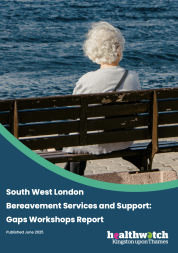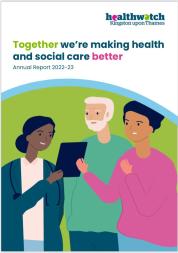Bereavement Services and Support in Kingston - Community Engagement Report

South West London ICB welcomes this report, which was commissioned to build a more comprehensive picture of the impact of bereavement on our local population. One particular aim of the research was to suggest how access to support and services for our under-served communities could be improved and Healthwatch Kingston and Kingston Voluntary Action have done excellent work in enabling those voices to be heard. The South West London ICS brings all aspects of health and social care, including the voluntary sector, together, with refreshed commitment to tackling inequalities in outcomes, experience and access. This research identifies a clear need for better co-ordination of bereavement support and services, as well as higher quality resources. It recognises that many people in the early stages of grief will be engaging with a range of difficult bureaucratic processes of which they may have no experience. In particular it highlights some of the support needs of vulnerable groups, the effects of the Covid-19 pandemic, and the experiences of professional groups such as registrars from whom we rarely hear. Thanks to the stories that local people have shared, this report will inform the co-design of bereavement support and services in Kingston. Next steps see this report being shared with the other South West London boroughs as they consider how they will use the findings to improve bereavement support and services for their own residents.
Healthwatch Kingston and Kingston Voluntary Action adopted a community engagement approach, explored the lived experience of those accessing services/support, what mattered most when grieving and the intersection with culture, faith and language barriers.
Bereavement services can be offered through a range of individuals and providers, including those in the NHS, charity and voluntary organisations, through communities and other peer-led organisations, and in some circumstances, legal and corpo-rate services (including probate firms and funeral providers amongst others).
This report provides examples of local people’s experiences that they shared and covers the perspectives of community groups, bereavement services and health professionals on local provision within this triangulated report.
We were delighted with the collaborative approach to this research, and the valuable participation of respondents and of our partners in the NHS, charity and voluntary sectors and the community support we experienced.
Download the report
Healthwatch Kingston key recommendations for the future:
- ENSURE actions taken in response to the Kingston community engagement pilot recommendations align with the South West London End of Life Care action plans.
- ENCOURAGE collaborative working between the borough bereavement officer, responsible for the local council funeral service, and organisations within Place.
- PROVIDE bereavement services, crematoria and burial sites to meet the needs for all faiths, beliefs, and life philosophies.
- ESTABLISH an RBK funeral service
- CREATE a multi-agency task and finish group to develop services, and a set of agreed bereavement service standards in consultation with local community groups.
- CO-PRODUCE a multi-cultural leaflet/document that is available to print and accessible digitally, of the practical steps on how to arrange a cremation or burial service, and how to access support services
- MAKE all information about bereavement services and support accessible through Connected Kingston as the digital hub for the borough, to raise awareness of the local offer.
- CO-COMMISSION short educational films and other media to remove the fear of the unknown and stigma related to death and bereavement.
- IDENTIFY what bereavement services and support networks are available for people with varying capacity to engage
- IDENTIFY what bereavement services and support networks are available for children and young people
- REDUCE waiting lists for access to bereavement services and support.
- INTRODUCE voluntary bereavement champions within the community
- UNDERSTAND the development needs of frontline staff and community volunteers to support culturally sensitive services
- PROVIDE pandemic specific support for frontline staff and residents/community members (such as care home staff and domiciliary care workers) who may have experienced trauma due to individual or multiple losses including social isolation, employment, and financial security.
- OFFER all individuals who are experiencing a terminal illness (including their families, friends, and other carers), diverse and culturally appropriate, accessible information and support to assist in making pre-death funeral arrangements.
- INCREASE identification of people who may be anticipating grief (for example in a care-giving role) as well as people experiencing grief following a loss and signpost more people with bereavement needs to bereavement services and support.
- OFFER families, friends, carers, and others involved in pre-death care who are affected by the death, practical and emotional bereavement support, ensuring this continues as required after the funeral, including access to their pre-existing care support networks.
The research showed us that there is much to be done to improve our bereavement services across the board, and that improving access to relevant, helpful information is crucial. GPs and hospital services need to know what is available locally and have up to date information to support their communities.
So, what are we doing next?
- This will involve the co-design of future bereavement services and support over the coming months in Kingston.
- This project approach can now be replicated across the SWL ICS at Place to help improve bereavement services and support more widely.
- A Bereavement Services and Support QI Implementation Framework has been created which provides guidance and templates as used in this project.
- This work is in the context of the wider Compassionate Communities programme of work being delivered at SWL ICS level.
- All Places will be invited to review the recommendations of the Kingston report and to sense-check for their local population by using a scaled application of the engagement activities piloted in Kingston.
What have we done since?
Building on this work, Healthwatch Kingston and partners worked to engage underrepresented groups through community workshops, surveys, and youth-led creative projects, to better understand experiences of grief and the accessibility of bereavement support across south west London.
In June 2025, we published our South West London Bereavement Services and Support: Gaps Workshops Report, outlining key recommendations to help enhance bereavement services and support across south west London.

